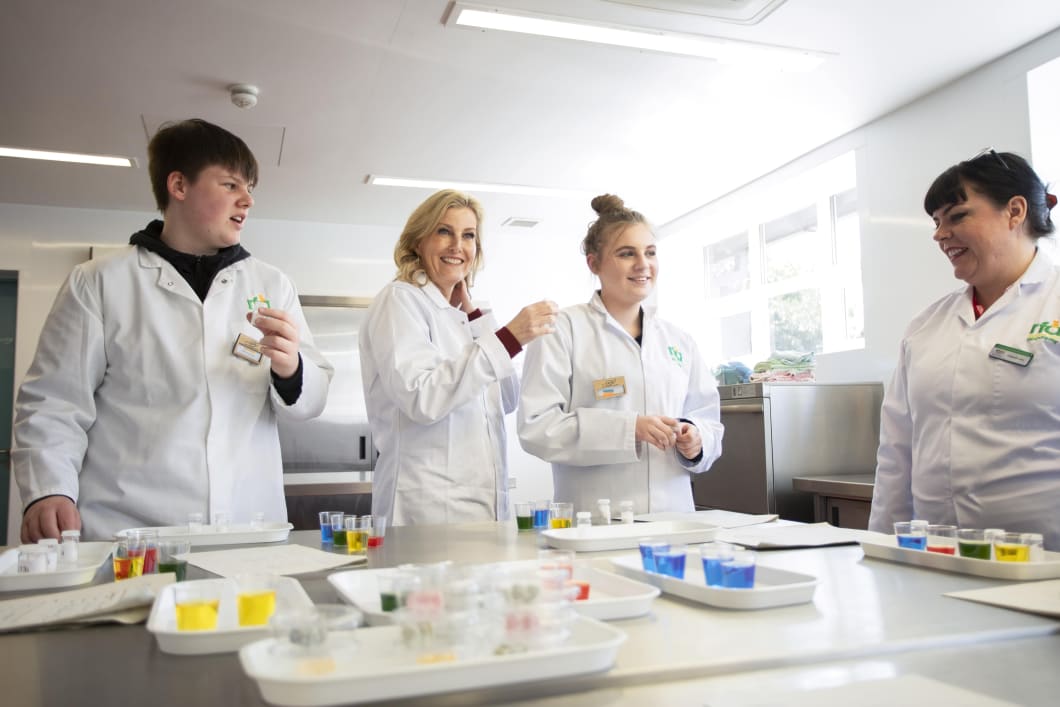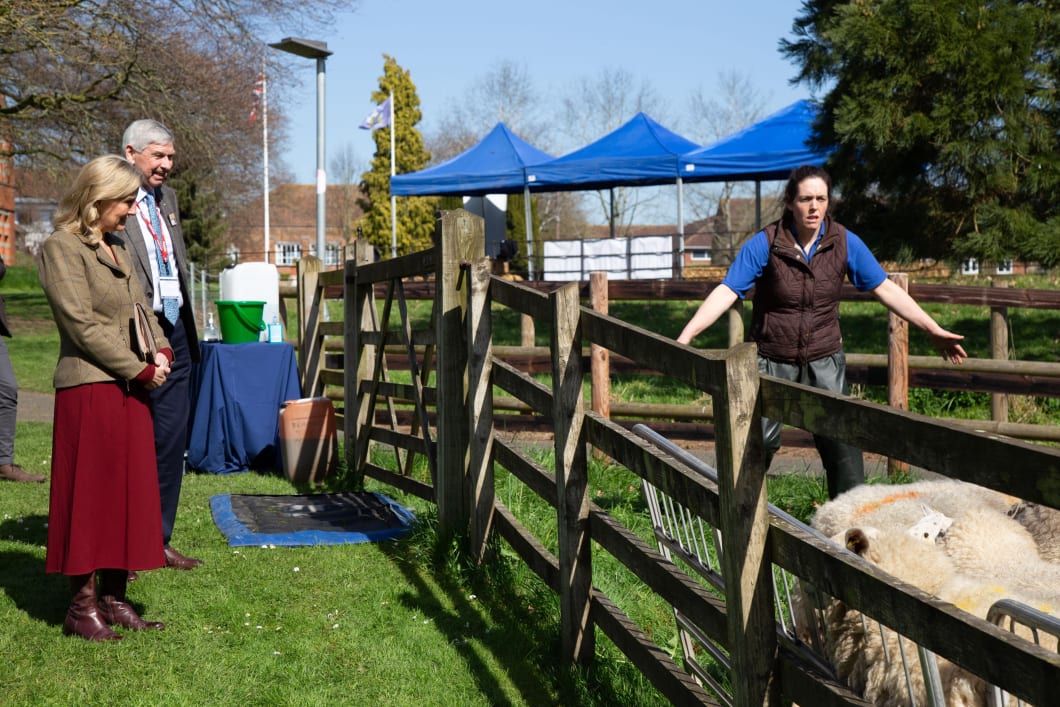- About Integrated Farm Management
- Our LEAF Network of Demonstration Farms & Innovation Centres
- Resources
- LEAF Sustainable Farming Review
- LEAF Endorsed Advisors & Consultants
- Our Projects & Partnerships
- Nature Based Solutions to Climate Change
- Beacons of Excellence
- Resilient & Ready
- Accelerating & Demonstrating the Journey to Net-Zero
Time for a fresh look: LEAF Education's research sets out to inspire the next generation of agricultural leaders
The agri-food industry is best placed to engage, motivate and inspire 12-19-year-olds about the sector and how to get involved in it. That’s the overarching message from LEAF Education, the lead agri-education organisation in England and Wales, as it announces its latest research, of 2,500 young people, in partnership with McDonald’s UK and Harper Adams’ School of Sustainable Food and Farming.
Whilst the majority of young people have not had the opportunity to learn about the agri-food industry in school (66%), 75% believe that agriculture and food education should play a larger part in the school curriculum. The research looks at how much of a ‘conscious consumer’ the next generation are, with results showing that teens are certainly keen to know and understand more, with 80% wanting to learn more about sustainable food choices. They also highlighted a trust in supermarkets and big brands to make those sustainability decisions on their behalf, before products hit the shelves or restaurants (65%). Young people are now calling for a better understanding of environmental labelling – far above carbon cost, food miles and how choices they make can have a bigger impact on the climate crisis. 84% of young people stated with the right and clear information, environmental sustainability would be their number one factor, over and above cost or convenience when purchasing food.
As part of the culmination of the research, HRH The Duchess of Edinburgh joined students for the first day of a 2-day residential at Harper Adams University. The Duchess took part in high-tech agri-food sessions, designed to showcase the breadth and depth of our modern agri-food industry and listened to the students’ career aspirations and understanding of sustainable food choices.

Speaking last week to confirm the next steps for industry, Beth Hart, Vice President Supply Chain & Brand Trust, McDonald’s UK & Ireland said of the findings: “Our business relies on over 23,000 British and Irish farmers to produce quality ingredients that go into our products, so ensuring a resilient and successful agri-industry is critical for both their futures and securing ours too. That is why we’re so passionate about engaging and inspiring the next generation who can bring fresh thinking to the sector, particularly when it comes to sustainability. We are committed to supporting LEAF Education to help us achieve this and look forward to working together to ensure these research findings inform how we make a difference.”
This latest research from LEAF Education shows that young people are hugely positive about the agri-food industry, with 9 in 10 stating that we should all appreciate and have a better connection to where our food comes from. And with 91% of young people believing our individual food choices are important in the fight against climate change, it is no wonder that the younger generations are looking to engage with the agri-food industry more than ever.
Announcing the research findings, Carl Edwards, LEAF Director, Education and Public Engagement, said: “This research follows our first pioneering teenager study in 2018. Since then and over the last five years we have worked with, trained and supported millions of young people, teachers, farmers and the public, to deliver against the outcomes. This new research is far wider reaching on current issues that are important to the next generation, and the future of the agri-food industry as a whole. The impact of our work; motivating and inspiring young people to have an appreciation and understanding of the industry and to light a fire for them to get involved, has gone from strength to strength in the past year, as detailed in our latest Impacts report, but we can’t stop there. The results of this latest survey will inform our work going forwards and encourage action to be taken by our partners across the agri-food and education industries.
“This generation has a real desire to know more, ask questions, and want experiential learning – talking directly to the professionals. The majority of teenagers see the agri-food industry as a well-skilled sector, describing it as a resilient, rewarding, fulfilling and well-paid area of work. Very different from perhaps our own misconceptions of what we think young people might suggest, with 76% saying they think an agricultural degree would give them a wide range of transferable skills and broad knowledge of land use and the environment.”

Furthermore, most young people have a positive opinion of farmers’ sustainability efforts. 77% believe farmers look after crop health on their farms, while 75% say it’s important that farmers consider the environment, and 89% think UK food producers are more likely to care for the environment than those in other parts of the world.
The majority of young people (68%) also agree that farmers are responsible for providing healthy food; 74% say planning and organising the farm is an important part of what farmers do and 73% say the outdoor environment is a place to improve our own health and wellbeing. Almost half of teens in LEAF Education’s research think we should prioritise making healthy food affordable for everyone (47%) and providing more varied diets for our growing population was also seen as important by a third of respondents. 83% agree that science and innovation will underpin a future for farming, meaning sufficient, high-quality food for all and an environment fit for future generations.
“As our population becomes more diverse,” says Carl Edwards, “farmers and agriculturalists need to understand young people’s changing perceptions of the agri-food industry as a possible workplace. Three in five of the teenagers see food and farming as a welcoming industry to new entrants from diverse communities, believing that the food sector especially seeks diverse voices to support with product development, as well as providing more offers and opportunities in supermarkets.
“The insights in this study are hugely valuable. Not just for future careers in our sector but as future consumers. Teenagers recognise the industry’s importance to their lives, but there’s more to be done to make them informed and conscious consumers of the future. Providing practical steps to enter our industry is a clear ask of them, and we need to work together to achieve it.”
The research is a culmination of almost a year of working with young people across the UK and together LEAF Education, the School of Sustainable Food and Farming at Harper Adams and McDonald’s UK and their Progressive Young Farmers have delivered something that has real results for industry to deliver against.
